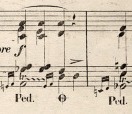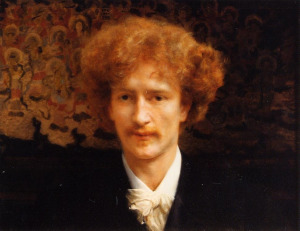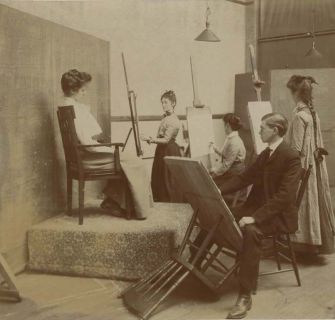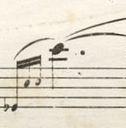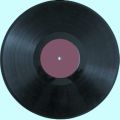The pianist Fou Ts'ong played a solo concert in Jordan Hall including Chopin's Opus 35 Sonata. In the famous "Funeral March," he made an unbelievable racket with the left-hand trills. They were noisy, unpleasant, almost veering out of control. In a masterclass at New England Conservatory, during that same visit to Boston, Fou Ts'ong manifested such subtly refined attention to details of sound, and line, and phrase. Everything. But, those trills … [Read more...]
Precedent
Near the beginning of T. S. Eliot's "Portrait of a Lady" there are these lines: "We have been, let us say, to hear the latest Pole Transmit the Preludes, through his hair and fingertips." Were those the celebrated red locks of Paderewski? Like many Poles playing the piano, he specialized in Chopin. There were so many Chopinists in the early years of the twentieth century -- just as sound recording really got going -- that, although we … [Read more...]
Lineage
After a concert I played in Munich in May, there was a question-and-answer session. (I performed music written by Alvin Curran, Sylvano Bussotti, and Earle Brown.) One audience member asked if a performer of newish music still needs to study Chopin's etudes? Since the pervasive use of photography by visual artists, the question arises in art schools: "Do art students need to learn how to draw?" To the question in Munich, my immediate … [Read more...]
Resolve
In classical music, many gestures need to "resolve." A dissonance, a departure from the harmonic (or melodic, or rhythmic) norm needs to be brought back to normality, disturbances need to be calmed -- "action" needs resolution. Chopin: Opus 44 This dotting of the "i," this attentive management of the small phraselet, is often subsumed in an attention to, or a desire for larger shapes. But music becomes generalized very easily. Large … [Read more...]
One day
When I was a kid I read a lot of books about musical performers, books filled with fantastic tales, of adventures on tour, of transcendental virtuosity -- in the pre-recording era. This stuff can fire a teenager's imagination. After reading about Arthur Rubinstein learning Franck's Symphonic Variations on a long train ride (he went from the station to the first rehearsal), and Josef Hofmann performing a short piece after only hearing another … [Read more...]
Roll
Some elaborate preparations to long notes in piano music are attempts to mimic the ways singers can begin a sound. The many shadings and extensions of initial consonants may get translated into piano music as multiple short notes, usually notated in small print. Though often marked with a slur, this kind of writing can still be confusing. The articulateness of the keyboard is certainly what's not wanted -- these are compound sounds. I … [Read more...]
Withdrawn
Sometimes a piece of music is "withdrawn" from a composer's catalog. Music that was composed, published, and available is taken back -- rescinded. You can't get it anymore. Usually, the composer has thought better of it: the music doesn't hold up now, the composer's style has changed a lot, it's an early piece that just doesn't seem good enough for public display... All of Philip Glass's early non-tonal music is unavailable now. I play(ed) a … [Read more...]
Tail wind
My flight to Los Angeles took over six hours. Coming back to the east coast with a strong tail wind making the flight easier and faster, the flight lasted only four hours and twelve minutes. Rudolf Serkin is sometimes credited with having said: "Playing the piano is easy, if everything goes well." Raising the question, "What about when it doesn't go well?" Then it's harder, then it takes more fuel. Then, you need to be an "expert," a "master," a … [Read more...]

